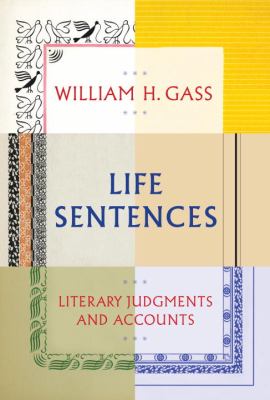Dearest Readers,
We are constantly bringing in new titles to our shelves, both physically and virtually, for you to browse and enjoy. Today, we bring to you a review of one of these brand new books to our shelves, reviewed by one of our very own staff members. And don’t forget, every book we review is available for you to check out and enjoy at your leisure!

Gass, William H., Life Sentences: Literary Judgments and Accounts. New York, NY: Alfred A. Knopf, 2012.
In a collection of essays and lectures drawing on his professional experience as an essayist, novelist, literary critic, and former professor of philosophy, William Gass formulates a multifaceted exposition on books and writing that is at once informative, witty, and inspiring.
The book is divided into four parts. The first, “Personals Column”, is largely a biographical reflection on Gass’ lifetime relationship with books and writing. The essays in the second part of the book, “Old Favorites and Fresh Names”, are thoughtful and often entertaining reflections on the work and the lives of several writers including Gertrude Stein, Proust, Nietzsche, Kafka, Malcolm Lowery, Henry James, John Gardner, Katherine Anne Porter, Knut Humson, and Richard Evans.
The third part of the book, “The Biggs Lectures on the Classics”, is a series of reflections on the evolution and application of Greek philosophical concepts such as form, mimesis (portrayal), and metaphor to good literature. The final part of the book, “Theoretics”, opens with a humorous essay on lust. It is followed by an essay on the importance of factors such as word choice, word placement, narration, and signification in literature. The final essay on the aesthetic structure of the sentence continues Gass’ exposition on what sets literature apart from other forms of writing. Here, he makes the point that unlike other forms of day-to-day writing, which aim for clarity of communication, literature often aims for something more artistic and poetic. Throughout, Gass employs excerpts from several notable writers.
For an entertaining and thought-provoking romp through literary and cultural history, read and enjoy Life Sentences.
Click here to check on the availability of this book or to learn more!
Contributed by Jesús Campos, Director of Library Technical Services